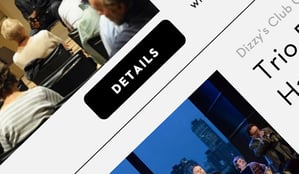
 The last thing any organization wants is to be left with unsold tickets on event day. To prevent this from happening, it’s important to make sure your online ticket sales are as strong as possible, by strategically promoting and spreading the word about your event on your website, blog posts and social media.
The last thing any organization wants is to be left with unsold tickets on event day. To prevent this from happening, it’s important to make sure your online ticket sales are as strong as possible, by strategically promoting and spreading the word about your event on your website, blog posts and social media.
Here are seven ways to get started:
1. Create an optimal user experience.
To begin, make sure visitors can easily find the event sales page by placing prominent calls-to-action, or CTAs, throughout your events website – on every page and at the end of all your blog posts. Once visitors arrive on the sales page, they should immediately understand what the event is about and why they should attend. From there, we recommend making the checkout process as quick and painless as possible, by only asking for information that is absolutely necessary, including their name, email address, and credit card information.
2. Use photos to showcase the event on your website and social media.
Photos stand out more than text, so they’re a great tool to use when trying to improve your online ticket sales. On the event sales page, use high-quality images that tell the story of what attendees can expect to experience at the event. On social media, build buzz and momentum by sharing photos of your team in the months leading up to the big day – including the planning, preparations and aftermath.
3. Promote the event via email.
Promote the event to your email subscribers, as these individuals are already engaged with your organization, and thus more likely to purchase a ticket. To do this effectively, we recommend tailoring your email messaging to different list segments so you can appeal to each unique type of attendee. For example, you may position your annual arts gala as a fun networking opportunity for young professionals, while encouraging your loyal, long-term donors to join you for an extravagant night out and a reward for their years of giving.
4. Use analytics to measure what is and isn’t working.
We always tell our clients to test everything and assume nothing. Testing is the only way to discover which strategies are working, and it can increase your ticket sales exponentially. On your event sales page, test different benefits, photos and headlines, and track conversions to identify which option your audience prefers.
5. Identify drop-off points on your website.
Drop-off points are high traffic pages where a lot of people leave your website after a brief visit. To identify these pages, Google Analytics offers very specific data that allows you to pinpoint exactly where your visitors abandon your site. From there, you can tweak your strategy to keep visitors engaged through the point of conversion. For example, let’s say your art museum is promoting a new exhibition with CTAs at the end of every blog post. If your blog posts are getting a lot of traffic but no ticket sales, you can fix that by trying a different CTA, using a bold graphic, and/or tweaking the layout.
6. Optimize your event sales page for mobile.
More and more people are making ticket purchases on the go, via their mobile device. To successfully reach these users, make sure your sales page is accessible via any device, so visitors can easily find your event, buy a ticket, and reserve their spot.
7. Send a thank you email that builds awareness for the next event.
Right after the event ends, secure ticket sales for the next one by reaching out to your attendees with an early-bird discount. This is an incredibly effective strategy because it builds on the momentum of the event that just ended and appeals to those attendees who had a great time.
by Jonathan Franchell, CEO of Ironpaper - For more tips and hacks: Need to remove a new line after h1 tags? Both web designers and SEO practitioners need to employ headline tags: H1, H2, H3 in several ways to improve web page structure and tag...

The Crowded Arena of the IT Marketplace Updated December 2024 The Information Technology (IT) landscape is experiencing rapid growth and intensifying competition. IT spending is projected to reach nearly 5.1 trillion U.S. dollars in 2024, a...

The marketing industry is transforming significantly due to generative AI and increasing market complexity. Gartner's prediction of a 25% decline in traditional search traffic suggests that the era of search engines is dying. AI tools, particularly...

Updated December, 2024 The field of digital marketing is evolving rapidly in response to new technology and changing buyer expectations. To help career-minded marketers, we’ve rounded up the top 10 skills needed to succeed in the field. These are...
